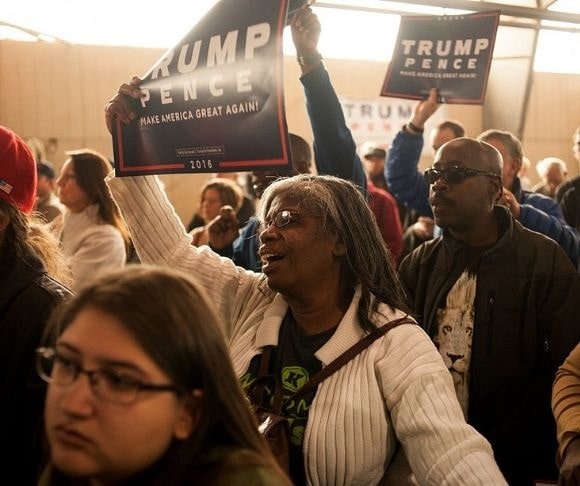Amid chants of four more years, President Trump introduced a roundtable of distinguished and prominent black Americans who view his administration as an asset to their community. As the nation closes out Black History month 2020, members of this large and at times raucous group were transparent regarding their support for the president. Critics might counter this event was nothing more than a photo op and holds little meaning for Election 2020. But what if that is not true? What if an increasing measure of the black population finds a warm, comfortable home in the Trump camp? Moreover, what can the Democrats do to thwart a potential black defection to the GOP?
What They Can’t Do
The left has taken to giving conservative blacks a verbal lashing at every turn. Following a statement at the presidential roundtable by former NFL safety Jack Brewer that Mr. Trump is the first black president, a CNN analyst melted down into a tirade. On the Don Lemon show, Keith Boynton let it rip:
“The idea that anybody would sit in a room with Donald Trump and call him the first black president after we had Barack Obama as the president of the United States. It shows just what kind of Uncle Toms were sitting in that room in the first place. That’s ridiculous. That’s an outrage that anybody would sit in that room and say something like that. That’s a shocking, appalling, disgusting thing to say.”
This type of Democratic insult to members of the black conservative community is not new, but it is one thing they can’t expect to continue working for them. As Dan Henninger of the Wall Street Journal points out, “An enduring condescension of our politics is that the voting preferences of minorities, especially black Americans, are monolithic and unchanging.”
 Henninger notes the migration of blacks out of typical urban areas and toward areas of “greater economic opportunity” – particularly in the south – is a problem for Democrats. So are Opportunity Zones, reminiscent of Jack Kemp’s Enterprise Zones, and a staggeringly low unemployment rate among blacks. As well the president’s criminal justice reform, which includes releasing blacks who have been incarcerated for a ridiculously long time, adds gas to the fire stoked by the Trump administration that may have blacks thinking more deeply about whom to vote for at the polls this November.
Henninger notes the migration of blacks out of typical urban areas and toward areas of “greater economic opportunity” – particularly in the south – is a problem for Democrats. So are Opportunity Zones, reminiscent of Jack Kemp’s Enterprise Zones, and a staggeringly low unemployment rate among blacks. As well the president’s criminal justice reform, which includes releasing blacks who have been incarcerated for a ridiculously long time, adds gas to the fire stoked by the Trump administration that may have blacks thinking more deeply about whom to vote for at the polls this November.
A flurry of polls just a few months ago charted a possible changing attitude among blacks about Trump, but the numbers don’t speak as loudly as Republicans may wish. The Washington Post accurately pointed out that reports of Trump’s ranking in the 30s among blacks is soft.
“A poll’s margin of error is based on the number of people polled as compared with the number of people in the population being sampled. The margin of error for an entire poll, however, does not apply to the totals for any subgroup data within that poll …Thus, a poll that has an overall margin of error of plus or minus 5 percent will have a significantly higher margin of error for any data reported about the black population.”
That’s a complicated way of saying the poll numbers brought forth in Emerson (35%) Marist (33% non-white), and Rasmussen (34%) surveys are not telling the whole story. If you drill down into the sub-groups one sees that the sample size of blacks or non-whites (depending upon the poll) is too small to support reliable numbers in the thirtieth percentile of the black population likely to vote Trump. But this does not mean the president isn’t rising at all among blacks, just that it might not be increasing at the level these three pollsters indicate.

(Photo by Theo Stroomer/Getty Images)
And that brings us to another cogent point WaPo author Henry Olson made: “Even small increases in his [Trump’s] black vote share could be decisive in an extremely close election.” This is where that all-important rubber meets the road. Mr. Trump doesn’t need 30% of the black population to put him over the top.
Axios reported, “In 2016, more than three times as many black men voted for Trump as black women. An estimated 30 million black Americans will be eligible to vote next year.” It’s black women that are Trump’s real problem, but if even a small surge of support for Trump among black men occurs, the Dems are up that famous creek. Last time around, Mr. Trump was awarded between 6-8% of the black vote. What if he gets 10%, 11%, 12% or even 13% this time around? This is a worrisome thought for Democrats, as it should be. As Newsday inked recently, “Minority voters — and black voters in particular — are an absolutely vital part of the Democratic base.”
Indeed, they are. It seems that since black men are more likely to vote Trump than women, calling them a bunch of Uncle Toms’ might not be the best method of gaining their support. Black or white, this is not a winsome electoral strategy. Keith Boynton and friends might want to mull this over as they sit in a fancy TV studio sipping their Starbuck’s blurting out ugly racial slurs – because even a slight bump in Trump’s support among blacks would mean nothing less than an electoral wipe-out for the Democrats.
~
Read more from Leesa K. Donner.




